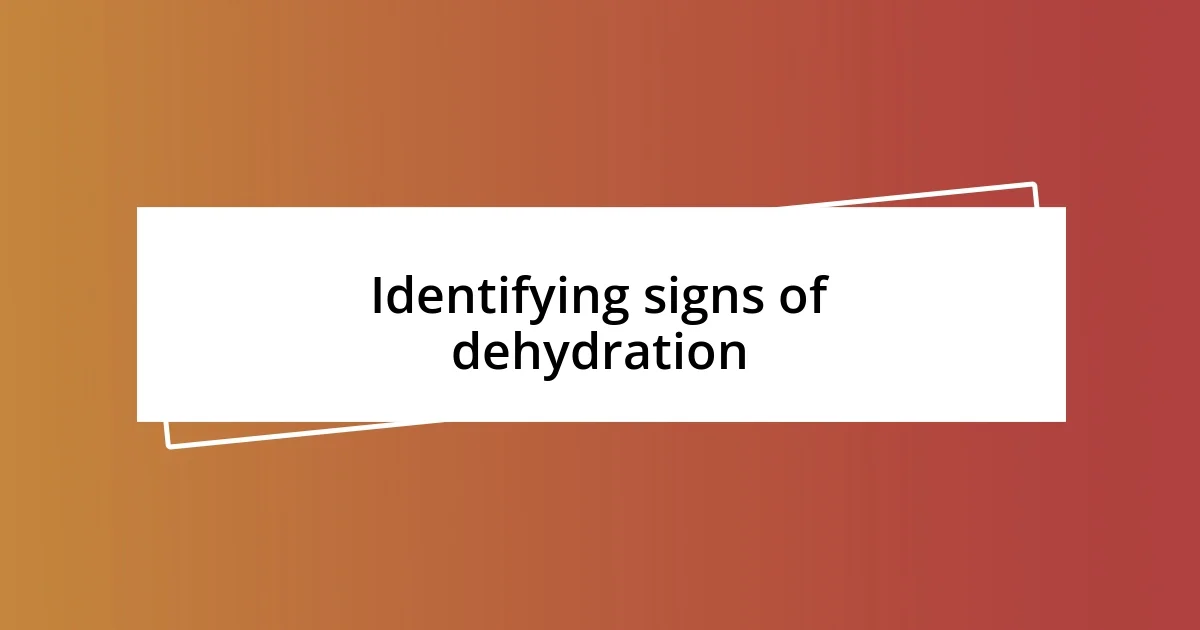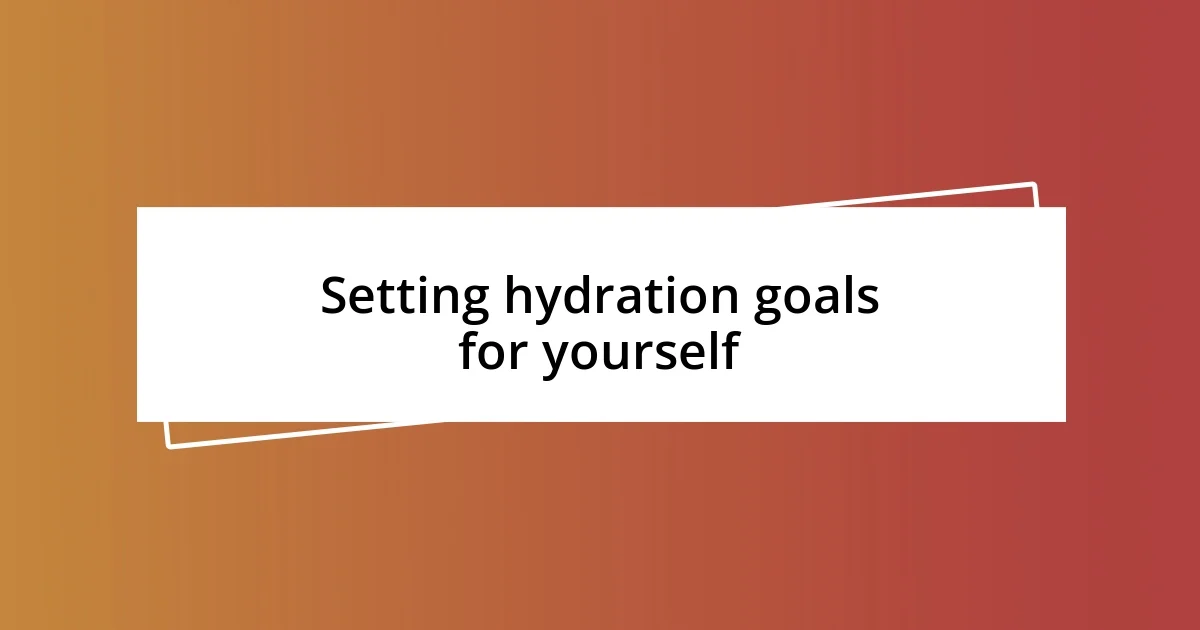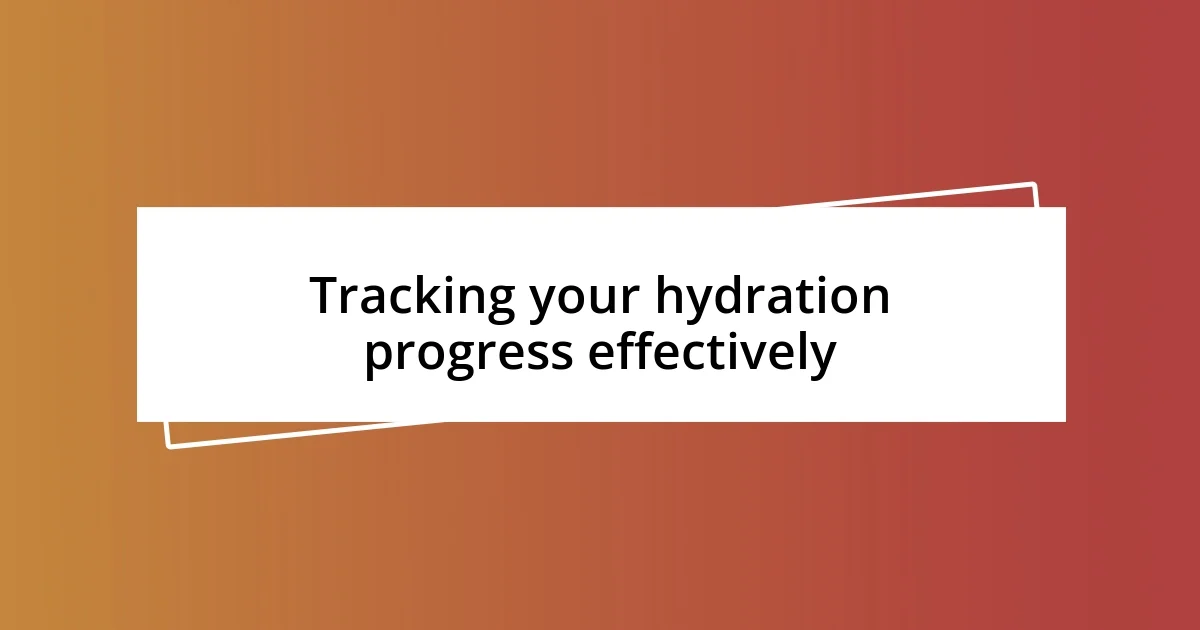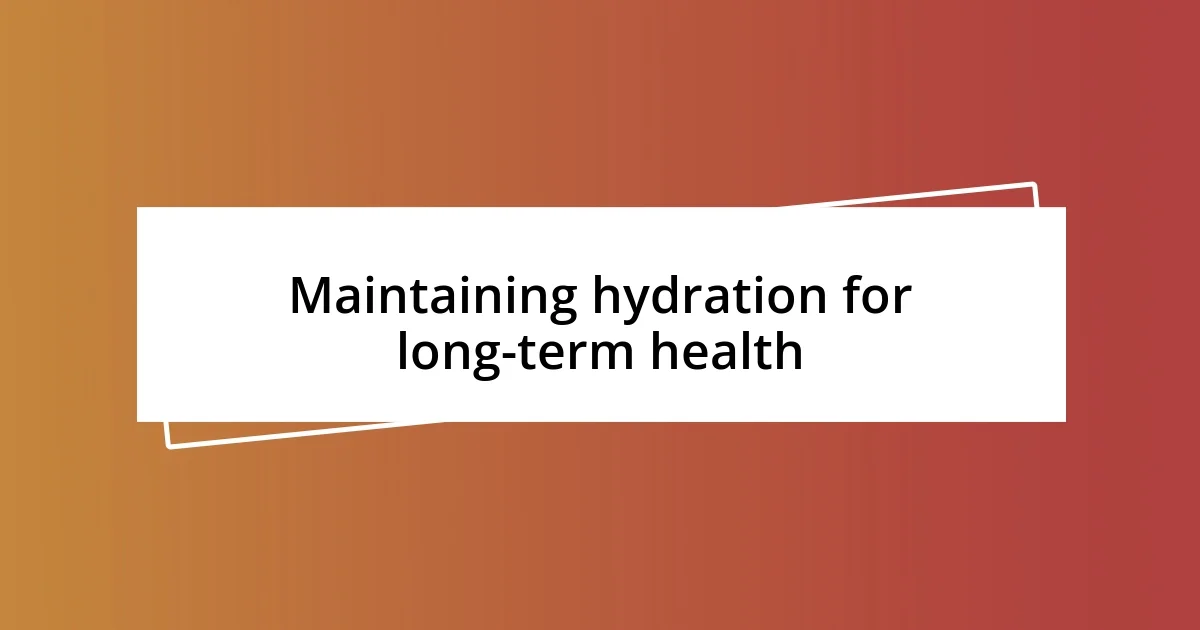Key takeaways:
- Hydration is essential for overall health, energy levels, and cognitive function; recognizing signs of dehydration like fatigue and dry mouth helps prevent serious issues.
- Setting SMART hydration goals and using reminders, such as apps or visual trackers, can motivate and empower individuals to maintain proper water intake.
- Incorporating water-rich foods and choosing the right beverages, like herbal teas and electrolyte drinks, enhance hydration and promote long-term health habits.

Understanding the importance of hydration
Have you ever felt that mid-afternoon slump where your energy just plummets? I’ve been there, and I realized that more often than not, it wasn’t just fatigue; it was my body crying out for hydration. Water is essential for nearly every function in our body, from regulating temperature to supporting digestion.
During a particularly hot summer last year, I discovered just how crucial hydration can be. I spent a day outdoors and, despite drinking soda, found myself feeling sluggish and dizzy. It wasn’t until I switched to water that I started to perk up again. This experience solidified my understanding that hydration goes beyond just quenching thirst; it’s about feeling alive and energized.
Moreover, often we forget that our brain is about 75% water. That’s why I now ask myself, “Am I drinking enough?” when I feel unfocused. With every sip, I’m not just hydrating; I’m nourishing my mind. This connection to hydration has transformed my daily routine, making me more mindful of what my body truly needs. It’s not just about drinking water; it’s about embracing the vitality that comes with it.

Identifying signs of dehydration
Recognizing the signs of dehydration can be quite eye-opening. At times, I’ve brushed off mild headaches, thinking they were just part of my busy day. It took me a few frustrating experiences to realize these were often my body’s subtle signals saying, “Hey, I need some water!” Here are some key signs to look out for:
- Dry mouth or swollen tongue
- Fatigue or lack of energy
- Dark yellow urine
- Dizziness or lightheadedness
- Rapid heartbeat or breathing
I remember one particularly grueling hike where I ignored my thirst. Halfway up the trail, I felt a wave of fatigue wash over me, and my focus wavered. It was alarming to realize that my body was warning me about dehydration. Pay attention to these signs—they can help you prevent more serious issues down the line.

Setting hydration goals for yourself
Setting hydration goals is a personal journey that can greatly enhance your overall health. I suggest starting by determining how much water you should be drinking daily. Personally, I found success by setting a goal of drinking half my body weight in ounces of water. For example, if you weigh 150 pounds, aim for about 75 ounces. Tracking this can turn hydration into an empowering daily ritual rather than a chore.
A significant aspect of setting hydration goals is making them SMART: Specific, Measurable, Achievable, Relevant, and Time-bound. I vividly remember creating a simple spreadsheet to log my water intake, which motivated me to stay on track. Over time, I noticed a shift not only in my energy levels but also in my overall mood. It’s fascinating how such a simple goal can create a ripple effect in other areas of your life.
Lastly, consider integrating hydration reminders into your daily routine. I utilized a smartphone app that buzzed every hour, prompting me to take a sip. You wouldn’t believe how quickly this became a habit! Hydration goals are more than just numbers; they represent a commitment to your health and well-being that can lead to profound changes.
| Hydration Goal Type | Description |
|---|---|
| Daily Water Intake | Track your ounces consumed each day. |
| SMART Goals | Set specific, measurable targets for accountability. |
| Reminder System | Use apps or alarms to prompt regular water intake. |

Choosing the right beverages for hydration
Choosing the right beverages for hydration is pivotal in my journey toward better health. I learned the hard way that not all drinks are created equal. For instance, while I used to reach for sugary sodas in the heat, I quickly realized they didn’t quench my thirst; they often left me feeling more dehydrated. Instead, I now opt for plain water or infused water with fruits and herbs, which not only hydrates but also adds a refreshing twist.
I also discovered the benefits of electrolyte-rich drinks, especially after intense workouts. One time, after a particularly long run, I felt absolutely drained. I sipped on a coconut water, and it was like I could feel the hydration flowing back into my body. It made me appreciate how important it is to choose beverages that replenish what we lose during physical activities. This brings me to ponder: What can we do to be more mindful of our choices? For me, it means reading labels and understanding what’s in my drink, rather than just grabbing whatever is available.
Lastly, herbal teas have become a staple in my hydration routine. On chilly evenings, I replace my usual nightcap with a warm cup of chamomile or peppermint tea. Not only does it help me unwind, but I also find it surprisingly hydrating. I often ask myself how these little switches can make such a big difference in my day-to-day life—it’s like turning a mundane ritual into a relaxing moment of self-care. What beverages have you found to support your hydration journey?

Incorporating water-rich foods into your diet
Incorporating water-rich foods into my diet has been a game changer. I vividly recall the first time I added cucumbers to my lunch; the crunch combined with their refreshing taste was an instant delight. Every time I look at a platter of watermelon, I can’t help but smile, knowing that I’m nourishing my body while enjoying nature’s candy. It’s fascinating how something as simple as a piece of fruit can boost hydration and enhance your meals.
I often think about how busy life can get, and that’s where water-rich foods really shine. When I find myself rushing out the door, I usually grab a handful of grapes or a slice of cantaloupe. They’re so easy to incorporate into my day—it’s as if they’ve become my quick hydration allies. Have you ever noticed how these snacks not only satisfy your hunger but also keep you feeling fresh? I can attest to feeling more energized and alert after munching on a fruit-filled breakfast instead of my old, heavier options.
Soups and broths have also made their way into my regular meal rotation, especially during colder months. A steaming bowl of minestrone is not just comforting; it’s packed with veggies that hydrate and nourish. I love to experiment with different herbs and spices, creating a personal signature that feels both soothing and revitalizing. Just imagine sitting down with your favorite bowl of soup—how does that warmth and hydration wrap around you like a cozy blanket? These experiences remind me how enjoyable staying hydrated can truly be.

Tracking your hydration progress effectively
Tracking my hydration progress has been a transformative experience, one that has helped me stay accountable to my health goals. I remember when I first started; I simply used a water tracking app. It was enlightening to see how easily I could forget to drink throughout the day! Now, each time I log my intake, I don’t just see numbers – I feel an immediate connection to my health journey. Have you ever had that moment when seeing data suddenly sparks motivation to make changes?
I also found that keeping a visual tracker, like a water bottle with marked levels, works wonders. One time, I filled it up in the morning and set it on my desk as a constant reminder. Watching those levels drop felt like a small victory with every sip. Plus, it’s rewarding to visualize my progress instead of just relying on memory. Have you tried using something similar? It can turn an otherwise mundane task into a daily achievement, reinforcing the importance of hydration in a fun and motivating way.
Sometimes, I share my hydration journey with friends. When we discuss our day-to-day habits, it opens up a whole new dialogue about health. This community aspect, whether through social media or a simple chat over coffee, really enhances the experience. Connecting over struggles and successes reminds me that we’re all on this journey together. Do you have a hydration buddy or a group that keeps you motivated? It can be an incredible way to build positivity into your hydration routine!

Maintaining hydration for long-term health
Maintaining hydration for long-term health isn’t just about drinking water; it’s about creating sustainable habits. For me, discovering herbal teas was a revelation. I fondly remember the cozy evenings spent sipping chamomile or peppermint tea, not only reaping the hydration benefits but also feeling a sense of calm wash over me. Have you ever experienced how something warm and soothing can change your entire mood? That comforting ritual has become a staple in my day, helping me connect hydration with relaxation.
I’ve also learned to listen to my body and its signals. Your thirst cues are your body’s way of communicating its needs. I once ignored my thirst during a long hike, thinking it was manageable. I learned the hard way that by the time I felt thirsty, I was already a bit dehydrated. Now, I focus on drinking water throughout the day, prioritizing hydration like it’s as essential as my morning coffee. Don’t you think it’s enlightening how a simple bottle can remind us to nurture ourselves throughout our busy lives?
Lastly, I’ve started to pay attention to the environment around me. Seasonal changes mean my hydration needs fluctuate, and adapting to that makes a noticeable difference. During the summer months, I aim for lighter, cold-infused water with mint and berries, which feels quintessentially refreshing. But in winter, hot lemon water reigns supreme! I can’t tell you how invigorating a steaming cup can be when the chill hits. Have you noticed how tuning in to the seasons influences your health habits? Embracing those shifts has made staying hydrated not just a task, but a truly enjoyable experience.














